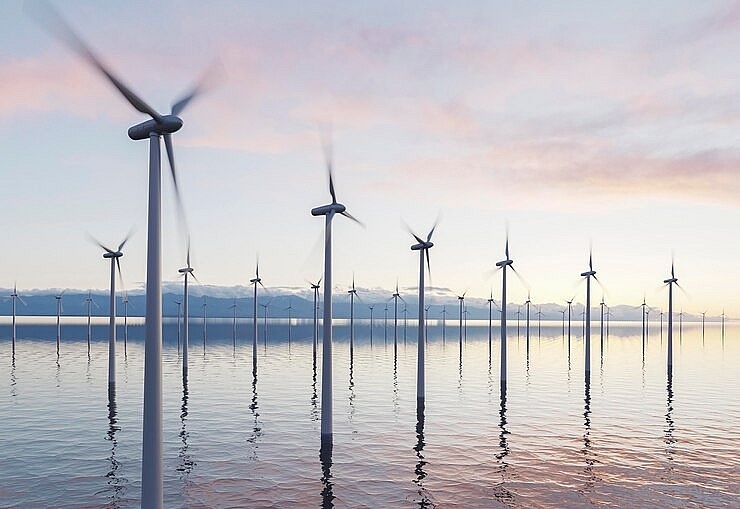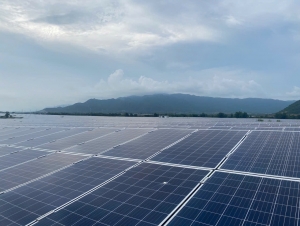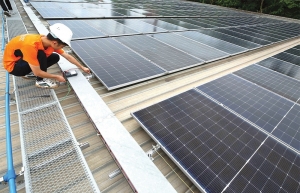Implementation woes hinder clean energy projects
At an October conference addressing challenges faced by renewable energy projects, held in the south-central province of Khanh Hoa, Deputy Prime Minister Nguyen Hoa Binh emphasised that renewable energy aligns with global trends and Vietnam’s investment priorities. “However, some projects have faced legal issues, and the Government Inspectorate has provided guidance following its investigations,” Binh said. “Many projects continue to face numerous challenges that must be addressed to prevent waste of valuable energy resources.”
Renewable energy projects contribute roughly 20 per cent to Vietnam’s total electricity production, representing an investment of about $14 billion. However, many of these projects, despite their operational readiness, are hindered by the lack of a clear policy on power purchase agreements. As a result, while some projects have started partial operations, others remain in limbo, awaiting regulatory clarity.
To encourage investment in clean and renewable energy, the government has issued supportive mechanisms. Yet obstacles in implementation have left 85 projects – 77 wind and eight solar – struggling to activate their capacities. Together, these projects represent over 4,700MW of unutilised power, largely due to an absence of guaranteed rates and unresolved policy issues.
 |
| Implementation woes hinder clean energy projects, illustration photo/ Source: freepik.com |
In the Central Highlands province of Gia Lai, a wind power plant with a 100MW capacity represents an investment exceeding VND4 trillion ($160 million). The 2020 pandemic and extended lockdowns delayed the project’s completion, disqualifying it from the previously available feed-in tariff (FiT).
Tran Huy Hoang, general director of Gia Lai Investment and Development Wind Power JSC, said, “Nearly two years without generating power has resulted in losses of around VND500 billion ($20 million) in revenue, along with annual loan interest of VND300 billion ($12 million).”
Even projects meeting FiT criteria face challenges. The Hoa Binh 5 wind power project in the Mekong Delta province of Bac Lieu, with an 80MW capacity, cannot maximise its output due to insufficient transmission capacity.
Developer Nguyen Nhu Thuc said, “The main bottleneck is the reduced generation capacity since the 220KV transmission line from Bac Lieu to Soc Trang, managed by Vietnam Electricity (EVN), has not yet been completed.”
Localities are similarly affected by these unresolved issues. For instance, EVN owes the south-central province of Ninh Thuan approximately VND2.7 trillion ($110 million) for 46 wind and solar projects.
Tran Quoc Nam, Chairman of Ninh Thuan People’s Committee, said, “This is a considerable sum in today’s economic climate, and we urge the Ministry of Industry and Trade (MoIT) and EVN to address this backlog.”
To mitigate the financial impact on renewable energy investors, the MoIT introduced a transitional FiT last year, reducing rates by 21-29 per cent. However, of the 85 projects eligible, only 29 have been mobilised, and even then, the actual purchase price has been reported to be about half of the intended tariff.
According to Dang Manh Cuong, general director of Hanbaram Wind Power JSC, the transitional tariff still limits operational potential, with only 70-80 per cent capacity utilised. “Our plant’s revenue only achieved 30 per cent of our initial targets, insufficient to cover loan interest and operational expenses,” Cuong said.
Economist Tran Dinh Thien, former director of the Vietnam Economic Institute, voiced concern over these ongoing issues, stating that the delays waste both national resources and significant private investments. “Every day these projects remaining idle is a step closer to potential bankruptcies as their assets are underutilised,” Thien said.
The MoIT has been working closely with other ministries, agencies, and local governments to address these challenges. Tran Hoai Trang, deputy director general of the MoIT’s Electricity and Renewable Energy Authority, said, “Efforts are underway to ensure both state and private interests are safeguarded.”
Financial challenges remain a primary barrier to the development of renewable energy in Vietnam, with high investment costs and debt burdens mounting for each project. If unresolved, these bottlenecks could lead to increased energy shortages and missed opportunities to harness renewable resources like wind and solar energy, Trang added.
 | High-quality workforce embedded in Ninh Thuan's renewable energy development Thanks to international cooperation and close collaboration with businesses, the quality of workforce training for the renewable energy sector is steadily improving, paving the way for Ninh Thuan to become a new renewable energy hub. |
 | Investors seek stable renewables policies Several investors in Vietnam are seeking updates to the current legal system to remove problems for their renewable energy projects, with projects stalling and contractors quitting due to delays. |
What the stars mean:
★ Poor ★ ★ Promising ★★★ Good ★★★★ Very good ★★★★★ Exceptional
Related Contents
Latest News
More News
- Trung Nam-Sideros River consortium wins bid for LNG venture (January 30, 2026 | 11:16)
- Vietnam moves towards market-based fuel management with E10 rollout (January 30, 2026 | 11:10)
- Envision Energy, REE Group partner on 128MW wind projects (January 30, 2026 | 10:58)
- Vingroup consults on carbon credits for electric vehicle charging network (January 28, 2026 | 11:04)
- Bac Ai Pumped Storage Hydropower Plant to enter peak construction phase (January 27, 2026 | 08:00)
- ASEAN could scale up sustainable aviation fuel by 2050 (January 24, 2026 | 10:19)
- 64,000 hectares of sea allocated for offshore wind surveys (January 22, 2026 | 20:23)
- EVN secures financing for Quang Trach II LNG power plant (January 17, 2026 | 15:55)
- PC1 teams up with DENZAI on regional wind projects (January 16, 2026 | 21:18)
- Innovation and ESG practices drive green transition in the digital era (January 16, 2026 | 16:51)

 Tag:
Tag:



















 Mobile Version
Mobile Version